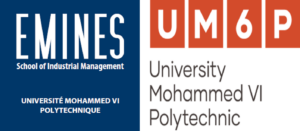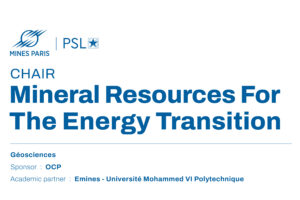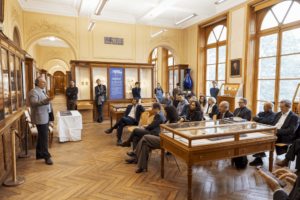Chair in Mineral Resources for Energy Transition
The Chair is developing a research and training program to meet the critical challenges of the energy transition. Focusing on resource availability, metal recycling and scarcity management, it explores sustainable solutions for securing the resources needed for renewable technologies.

Center :
The Geosciences Center of Mines Paris – PSL
Holder :
Damien Goetz, Professor at the Geosciences Center, in charge of the Soil and Subsoil option
Sponsor:
OCP (Morocco)

Academic partner:
Emines – Université Mohammed VI Polytechnique

The Chair
The “Mineral Resources for the Energy Transition” Chair focuses on the issue of mineral resources in the context of both the ecological transition (impact of mining on the environment and on water resources, foreseeable growth in the energy intensity of mineral resource production) and the energy transition (mineral resource requirements of renewable energy technologies, CO2 emissions linked to mining operations).
The Chair’s program is designed to meet the challenges of the energy transition in three major areas: production of primary resources, recycling, and controlling demand for metals. The initiative is based on an ambitious research program and a teaching component designed to train engineers specializing in the sustainable management of mineral resources, both for companies in the sector and for those whose activities are closely dependent on these resources.
- Focus 1: Resource availability
This area analyzes the limits of mineral resources such as copper and lithium, which are necessary for the energy transition. It studies production capacities, geopolitical constraints and environmental impacts, particularly in water-stressed regions. It covers both very long-term issues (declining grades, geopolitical impact of resource scarcity, resource depletion), and issues on the transition timescale (capacity to scale up production at the pace required by transition scenarios).
- Axis 2: Metals recycling
Recycling is studied as a partial solution to the need for critical metals, with a focus on technical and organizational obstacles. The aim is to improve material recovery to relieve pressure on primary resources. This approach will be fundamental, for example, in a sector such as Li-Ion batteries, which will require very large quantities of lithium, a metal whose production remained very limited until the emergence of this technology.
- Area 3: Managing resource scarcity
Faced with the increasing scarcity of metals, this area explores ways of reducing consumption through substitution, eco-design and material efficiency. It also examines how these strategies can be adapted to different contexts, notably in Africa, a continent whose cumulative contribution to greenhouse gas emissions and biodiversity loss is much lower than that of the Western world, and whose population is therefore naturally less inclined to consider limiting its consumption as part of a sober approach.

Holder :
Damien Goetz, Professor at the Geosciences Center, in charge of the Soil and Subsoil option.

Chair news
Mines Paris – PSL, in partnership with EMINES-UM6P, launches the Mineral Resources for Energy Transition Chair.

Mines Paris – PSL and EMINES-UM6P mark the launch of their new “Mineral Resources for the Energy Transition” Chair, dedicated to the challenges of sourcing, recycling and sustainably managing the mineral resources essential to renewable energy technologies.
The Chair, headed by Damien Goetz, Professor of Geosciences at Mines Paris – PSL, embodies an ambitious collaboration between the two institutions, supported by the Moroccan company OCP, patron of the initiative. Within the Geosciences Center, it is positioned as a place of innovation for engineers, researchers and students from Mines Paris – PSL and UM6P, to meet the urgent needs of the energy transition.

